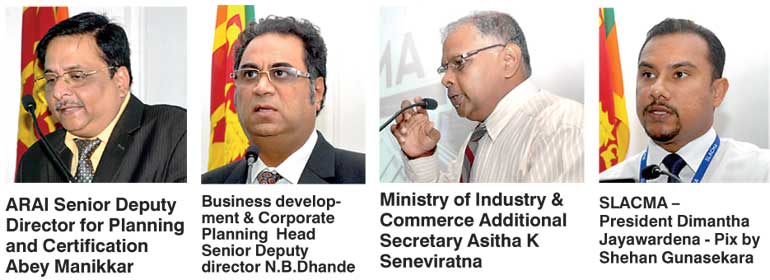Thursday Feb 19, 2026
Thursday Feb 19, 2026
Tuesday, 26 April 2016 00:07 - - {{hitsCtrl.values.hits}}
By Charumini de Silva
Sri Lanka’s automotive manufacturing sector has submitted a 20-year master plan to the Finance Ministry as a crucial step to take the industry to the next level as they seek certification from their Indian counterpart to boost growth.
“We have requested the Finance Ministry to have a representative official regarding automotive policy and we are trying to finalise an auto component policy for the next 20 years for which they have agreed upon,” Sri Lanka Automotive Component Manufacturers Association SLACMA President Damitha Jayawardene told the Daily FT.
He said that currently Ministry officials are in the process of appointing a committee comprising different departments related to this subject.

Jayawardene pointed out that local automotive component manufactures find it difficult to export their products as Sri Lanka’s automotive industry as well as auto component industry does not have motor component classification or certification authority.
Thereby SLACMA has invited the Automotive Research Association of India (ARAI) to provide those certificates to local automotive component manufactures to enter the high potential markets around the world.
ARAI is the highest standard research organisation and the certification body in the South East Asia.
The visiting experts of ARAI will be meeting the local automotive component manufacturers, officials of Industry and Commerce Ministry, Finance Ministry, Registrar of Motor Vehicles and Sri Lanka Customs Department to facilitate such a move for the local industry to venture into the potential international markets.
“Being the closest counterpart for a long period ARAI has come forward to help us to achieve this,” he added.
Highlighting that Sri Lanka already is working closely with China and Thailand markets he added that it was important for Sri Lankan automotive component manufacturers to get ARAI certificate as they were planning to venture into India as well as African markets in the immediate future.
Noting that the current automotive component market in Sri Lanka is heavily dependent on imports, he asserted the locally manufactured vehicle parts are much better than imported ones and that if they can obtain certificates for those it would help Sri Lanka boost its export earnings in near future.
According to Jayawardena, Sri Lanka’s automotive component manufacturing industry comprises of around 50 industries and 10 of these industries are highly successful.
Jayawardena said by September SLACMA is looking at signing a MoU with India’s Automotive Component Manufacturers Association (ACMA) which would greatly benefit the industry.